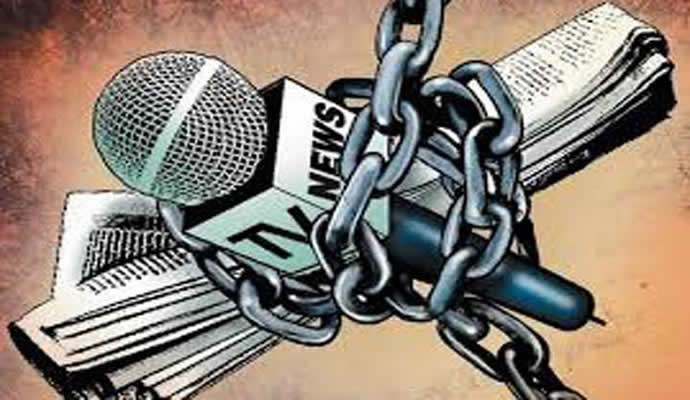Efforts to provide stronger federal protections for journalists were derailed on Tuesday evening after the U.S. Senate failed to pass the PRESS Act, a landmark shield law aimed at protecting journalists from being compelled to reveal their sources. The bill’s defeat came after Republican Senator Tom Cotton blocked its progress, citing national security concerns.
The PRESS Act, which enjoyed bipartisan support and was unanimously passed by the Republican-controlled House of Representatives in January, was expected to provide crucial legal safeguards for journalists. It would have prevented the federal government from seizing journalists’ communications data or compelling them to disclose confidential sources, except under narrowly defined emergencies, such as terrorism-related cases.
In a fiery speech on the Senate floor, Cotton justified his opposition by accusing the proposed legislation of enabling “deep-state leakers, traitors, and criminals.” The Arkansas senator went further, lambasting journalists whom he described as “America-hating and fame-hungry.”
“Passage of this bill would turn the United States Senate into the active accomplice of deep-state leakers,” Cotton said. “Contrary to what members of the press may think, a press badge doesn’t make you better than the rest of America.”
Cotton’s rhetoric sparked immediate rebuttal from Democratic Senator Ron Wyden, who has been a vocal supporter of the PRESS Act. Wyden expressed frustration over the bill’s failure but vowed to continue the fight.
“I understand that we don’t have unanimous consent today. I think it’s unfortunate. I think America would be stronger and freer if we were passing this legislation today. But we’ll be back,” Wyden said. He underscored the importance of the legislation, calling free speech a cornerstone of American democracy. “This is about as important as it gets. Free speech is fundamental to what makes our country so special.”
The PRESS Act seeks to address a longstanding gap in federal protections for journalists. While 49 states and the District of Columbia have shield laws or court-recognized privileges that protect journalists’ confidential sources, no such federal law exists. This legal vacuum has left journalists vulnerable to federal subpoenas and data seizures, particularly during leak investigations.
The bill would have ensured that journalists cannot be compelled to reveal confidential sources or information except under clearly defined circumstances, such as threats to national security or imminent violence. It also aimed to curb federal authorities from covertly accessing journalists’ phone and email records without their knowledge—a practice that came under scrutiny after several high-profile incidents during the Trump administration.
The PRESS Act’s failure comes amid heightened political polarization surrounding press freedoms and national security. Former President Donald Trump, who remains an influential figure in Republican politics and a leading contender for the 2024 presidential election, has consistently voiced hostility toward journalists. Trump previously threatened to jail reporters who refuse to reveal sources in cases he deems damaging to national security.
In a post on Truth Social last month, Trump urged Republican lawmakers to “kill this bill,” intensifying the political pressure against its passage. His statement echoed broader concerns within the GOP that the PRESS Act could obstruct federal investigations into leaks of sensitive government information.
“Journalists shouldn’t be given a free pass to undermine our national security,” one senior Republican aide told reporters after the vote. “The PRESS Act, despite its exceptions, risks emboldening leaks that harm the country.”
The failure of the PRESS Act drew sharp criticism from press freedom advocates and media organizations, many of whom had hoped to see the legislation passed before President Joe Biden’s term concludes. Advocacy groups argue that without federal protections, journalists remain vulnerable to government overreach, jeopardizing their ability to hold those in power accountable.
“This is a commonsense bill with broad bipartisan support,” Gabe Rottman, policy director at the Reporters Committee for Freedom of the Press, told reporters. “It’s time to get it across the finish line.”
Seth Stern, advocacy director at the Freedom of the Press Foundation, blamed Senate Democrats for failing to act decisively earlier in the year. “We need more than speeches about the PRESS Act’s importance. We need action,” Stern said in a statement. “Senate Democrats had all year to move this bipartisan bill, and now time is running out.”
Stern added that the bill’s failure reflects broader complacency in protecting press freedoms, especially in an era of increasing hostility toward journalists. “Hopefully, today was a preview of more meaningful action to come.”
The PRESS Act’s failure coincided with the release of a Justice Department report revealing that federal prosecutors violated departmental policies during the Trump administration by secretly seizing journalists’ phone and email records. These actions, carried out as part of leak investigations, renewed concerns over government overreach and the erosion of press freedoms.
Press freedom groups point to these incidents as evidence of the urgent need for federal protections. “Without shield laws like the PRESS Act, journalists risk becoming extensions of law enforcement, undermining their role as independent watchdogs,” said Rottman.
The Justice Department report highlighted how the lack of clear federal safeguards has left journalists exposed to government scrutiny. Media organizations argue that such actions not only compromise the confidentiality of sources but also deter whistleblowers from coming forward with critical information.
With the clock ticking on the current legislative session, the PRESS Act’s supporters are exploring alternative pathways to secure its passage. According to the Freedom of the Press Foundation, options include attaching the bill to a year-end spending package or pushing for a standalone vote. However, both strategies face significant hurdles, particularly in a divided Congress.
Senator Wyden remained optimistic despite Tuesday’s setback, reiterating his commitment to advancing the bill. “This isn’t over,” he said. “We’ll keep pushing to protect the free press and ensure that journalists can do their jobs without fear of government interference.”
The failure of the PRESS Act underscores the fragile state of press freedoms in the United States. Journalists and media organizations continue to face mounting challenges, from government surveillance to hostile rhetoric that undermines public trust in the press.
For journalists like Jane Doe, an investigative reporter who has faced pressure to disclose her sources, the absence of federal protections is deeply concerning. “Without shield laws, we’re left to navigate a legal gray area where the government can force us to choose between protecting our sources and facing jail time,” Doe said. “That’s not how a free press should operate.”
Press freedom advocates warn that the bill’s failure sends a troubling message at a time when misinformation and attacks on journalism are on the rise. “Protecting journalists isn’t about politics—it’s about safeguarding democracy,” Stern said. “The PRESS Act may have failed today, but this fight is far from over.”
The PRESS Act’s failure in the Senate represents a significant setback for press freedom in the United States. While the bill enjoyed bipartisan support in the House, its opponents have succeeded—at least for now—in blocking its progress amid concerns over national security. As the legislative window narrows, advocates and lawmakers face an uphill battle to revive the bill before the current Congress adjourns.
With press freedoms under increasing threat, the debate surrounding the PRESS Act highlights the urgent need to balance national security concerns with the vital role of a free and independent press in a functioning democracy. As Senator Wyden vowed, the fight for federal protections for journalists is far from over. For now, however, the PRESS Act remains stalled, leaving journalists vulnerable to government overreach at a critical moment for press freedom in America.




